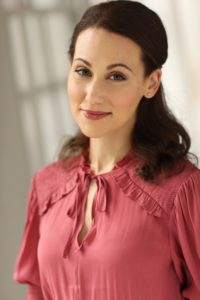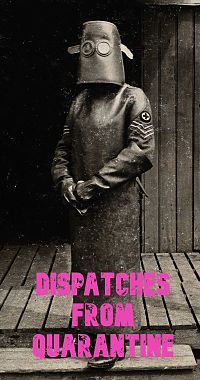This story is part of a package on the one-year anniversary of the COVID-19 lockdown.
I’d anticipated the first week in March 2020 since the school year began. Engulfed in the glorious bliss of performance week, five months of students’ efforts were poised to crystallize into performances to make everyone proud. Only the finale wasn’t gelling.
In the finale of Pippin, the show’s most complicated scene, Pippin is presented with the ultimate test: Jump into a pit of fire to stun spectators in a feat of glory, only at the cost of his life. Despite pressure from the chorus, Pippin defies them and returns to “ordinary” family life. In response, the riled-up ensemble destroys everything around him onstage, stripping away costumes, makeup, colored lights, and music, revealing a barren world. They taunt Pippin to find magic when all illusory accoutrements are gone: “You try singing without music, sweetheart.”
The scene demanded that each cast member harness 100 percent focus. As director, I galvanized my cast’s stamina to execute the complex musicality and staging. But now the clock was ticking, days away from opening a beast of a musical. I set a positive tone and assessed last-minute needs. “Please don’t get sick,” I prayed, “or hurt.” We wouldn’t have time to rehearse the back-up tracks with the understudies.
Students procured props from household treasure troves, several bringing in items for classmates to use. I showed them how to set up the prop table, using masking tape and markers to label sections. From home, I added a first-aid kit and an ice pack. Finally, a bottle of Purell between the king’s crown and the queen’s jewels. “There’s a virus going on, so please wash your hands!” I announced, while reminding them not to eat pizza in the theatre.
At that point the virus still seemed far away from East Side Middle School in Manhattan, but news of its dangerous incubation period and China’s battle to contain the spread frightened me. Determined to be safe, I avoided public transportation, counting my blessings that I could walk from my apartment to the school and the theatre.
Suddenly, showtime! The opening number, “Magic To Do,” thrilled the crowd! There was full attendance and commitment from the cast, fueled by an energetic and appreciative audience of peers happy to watch their friends and escape morning classes. I held my breath until the finale, which landed with maximum impact, aided by a nifty fire projection on the wall.

Outside the auditorium, however, a dystopian nightmare unfolded. Panic buying was emptying stores. At the Whole Foods on 57th Street, I watched a man sweep all the canned beans off the shelf with one wave of his hand. My friend texted a picture of a fully stocked toilet paper aisle at the Duane Reade on First Avenue and 72nd. An hour later, the packages were gone. The cashier told me customers had ripped rolls right out of the plastic.
Then, on March 12, Broadway announced its immediate and indefinite closure. I informed my class, adding, “If for some reason we are not in-person together next week”—words that sounded incredible as I spoke them—“just remember how lucky we were that our show took place!”
Lucky indeed. When the entire city closed down days later, I learned of countless productions and showcases that had abruptly been cancelled. I felt mixed emotions: gratitude that our show just made it, and guilt that other young performers were denied the same opportunity.
When we had rehearsed Pippin, I talked to the students about life’s material pleasures and luxuries. The quarantine stripped all that away as surely as the staging I’d devised for the finale, revealing how quickly our trusted framework evaporated. I wondered if my students were shielded from the death spiral forming in New York, never imagining how a musical’s philosophical question could impact a cast whose lives had been upended.
After an uncertain few weeks, our musical theatre class resumed online, and faces in squares replaced three-dimensional beings. Unfazed, my students had become distance-learning pros, proficient in mute-button maneuvering, camera framing, and personal headset use. Furthermore, they commanded status, as space at home needed to be reconfigured for optimal learning and musical performance. Sound control was paramount, and the students quickly determined what could be controlled (“Mom, stop using the blender, it’s my turn to sing!”) versus what couldn’t (the constant sirens outside).
Meanwhile, I embraced the digital format with zealous enthusiasm, implementing video-game style quizzes and sharing videos and photos, emphasizing the benefits of online learning: “Look what we can do here with all these gadgets and gizmos!?”
With the first beautiful days of spring, I wondered if the alluring weather and “Zoom fatigue” would cause a drop in attendance. Yet they signed on, week after week. We sang, danced, acted, and clowned despite the limitations of video conferencing, with its random delays, freezing, and mechanical isolation. I felt extra-sensitive toward anyone left out due to a technical glitch. My students demonstrated endless patience and grace toward one another.
Sometimes I daydreamed about that week in March in a dizzying recall of memories: the sound of mic checks, the sixth grader asking for help with makeup, the exhilarating reaction to a surprise remote-controlled robot duck (sorry, you had to be there), and the luscious strawberry shortcake I had at Tony’s Di Napoli after our closing performance—my true “last course” before the world I knew ended.
Spring semester drew to a close. Until then, I’d focused on the ideal balance of teaching and pushing the students within our weekly gatherings. Suddenly our newly assembled, precious sphere disappeared, and I felt trepidation. What lay ahead, with in-person school unlikely to return in the fall? I wanted to put the pieces together of our new way of learning, teaching, and performing, but how could pandemic life include teaching artists and live theatre?
While some semblance of school has returned for many New York students in hybrid form, it’s clear that live performance will be the last activity to return. Thankfully the artistic community has stayed responsive and improvised opportunities for aspiring performers to experience the pride and accomplishment of performance. Broadway and the larger entertainment community has rallied in support of student performers, inviting to them share performances online or join special casting meetings to compensate for the great disruption. Some of us did our best to keep a middle school theatre class going.
Almost a year since our March production, I’m currently “staging” a show entirely online. I often reminisce about life before COVID-19, when I was caught up in the bewildering chase of glamorous dreams in a big city. Did I ever truly appreciate the little things? Like Prince Pippin, I’ve reexamined my values. When the pandemic is over, will human nature revert again? Will we forget to appreciate the extraordinary ordinary?
Pippin‘s original finale left the audience with a “happily ever after” conclusion: Pippin realizes he prefers the quieter magic of mundane family life and walks off with Catherine and her son Theo. A newer, alternative ending extends the story: The audience is led to believe that the show is over, but then Theo emerges alone onstage, enticed by the troupe’s promise of glory, the very quest that Pippin had resolved. The ensemble appears ready to snatch Theo as the lights fade, implying that Theo, vulnerable to social pressures, is destined to repeat his father’s journey. It’s an unsettling finale, warning that each generation is doomed to relearn the lessons its predecessors learned, and it’s now the only version available for license by Pippin’s creator, Stephen Schwartz, who absolutely prefers this “second ending.”
I don’t know what anthropologists will conclude about this period. Words cannot replace lives lost or impacted. I’m a teaching artist, but I can offer some solace to students whose productions were cancelled, to performers who had just gotten their big break before being sent home, or to artists, crew members, and producers whose dreams were deferred: Don’t despair. We’re experiencing an alternate ending, an ending that has replaced the original script. It’s not more comfortable.
But I’ve seen the show. And it works.
Elana Safar (she/her) is an actor, educator, and coach based in New York City. Safar is a graduate of Brandeis University and New York University and her television credits include Quantico, The Blacklist, and Damages.



